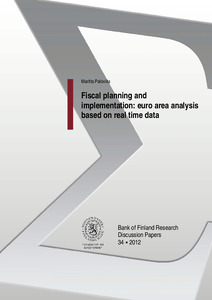Fiscal planning and implementation : euro area analysis based on real time data
Paloviita, Maritta (20.11.2012)
Numero
34/2012Julkaisija
Bank of Finland
2012
Julkaisun pysyvä osoite on
https://urn.fi/URN:NBN:fi:bof-20140807314Tiivistelmä
This study explores discretionary fiscal policies in the euro area during the time of monetary union (EMU). Ex ante budget plans and policy changes during budget implementation are investigated using real time data from the OECD Economic Outlook publications. The particular focus of the study is on fiscal adjustment to the recent financial crisis and the subsequent global recession. Estimated fiscal policy reaction functions indicate that in the EMU period ex ante fiscal plans in the euro area have basically been long-term oriented and counter-cyclical. In the course of the budgetary year, policies have typically been adjusted due to data revisions and new business cycle information. The crisis had a clear impact on discretionary policies. The periphery countries clearly adjusted their policies already in the budgetary planning stage, but other countries mainly reacted to the crisis during budget implementation. We provide evidence that short-term counter-cyclical fiscal policies may not have been consistent with sound and sustainable public finances. In order to maintain fiscal discipline and avoid excessive indebtedness, careful monitoring of macroeconomic imbalances and reliable as well as more accurate forecasts are needed. Overall, longer term fiscal policy orientation and continuous monitoring of the budgeting processes are crucial in good fiscal governance. Keywords: fiscal policy, real time data, planning stage, implementation stage, cyclical sensitivity, economic crisis JEL classification numbers: E62, E32
Julkaisuhuomautus
Published in Research in Applied Economics ; 6 ; 1 ; 15-37 ; https://doi.org/10.5296/rae.v6i1.4515
